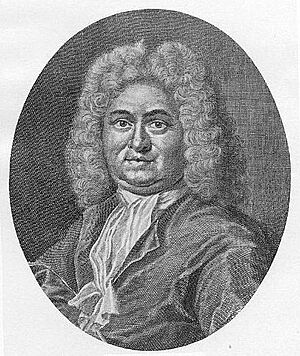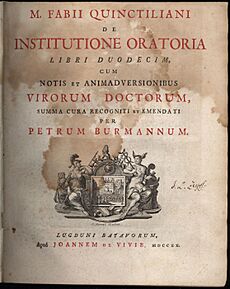Pieter Burman the Elder facts for kids
Quick facts for kids
Pieter Burman
|
|
|---|---|
 |
|
| Born | 1668 |
| Died | 1741 (aged 72–73) |
| Nationality | Dutch |
| Alma mater | Utrecht University |
| Scientific career | |
| Institutions | Utrecht University |
Pieter Burman (born July 6, 1668 – died March 31, 1741) was a famous Dutch scholar. He was known for studying ancient Greek and Roman writings. People sometimes called him "the Elder" to tell him apart from his nephew, who was also named Pieter Burman.
Contents
Pieter Burman's Early Life and Education
Pieter Burman was born in Utrecht, a city in the Netherlands, on July 6, 1668. His father, Franz Burmann, was a professor of theology at Utrecht University. This meant his father taught about religion and wrote many books, especially about the Old Testament from the Bible.
When Pieter was just 13 years old, he started studying at Utrecht University. He learned from famous teachers like Graevius and Gronovius. Pieter was very good at learning old languages, especially Latin. He could even write well in Latin.
At first, Pieter was planning to become a lawyer. So, he spent several years studying law. He also spent about a year studying at the University of Leiden. There, he focused on philosophy and the Greek language.
Pieter Burman's Career as a Scholar
When Pieter Burman returned to Utrecht, he earned his degree in law in March 1688. After traveling through Switzerland and parts of Germany, he started working as a lawyer. However, he never stopped studying ancient languages and history.
In December 1691, he got a job collecting taxes that used to be paid to the bishop of Utrecht. Five years later, he became a professor at Utrecht University. He taught about public speaking (eloquence) and history. Soon after, he also started teaching Greek and politics.
In 1714, he visited Paris for a short time. He spent his time exploring the many libraries there. The next year, he moved to the University of Leiden. He took over the important job of teaching history, Greek, and public speaking.
Pieter Burman later became a professor of history for all the United Provinces (which was the Netherlands at the time). In 1724, he became the 9th Librarian of Leiden University. He became famous across Europe for his many books and critical writings. He was often involved in lively debates with other scholars of his time.
Pieter Burman's Published Works
Pieter Burman spent a lot of time editing and publishing old Latin books. He created new versions of works by famous ancient writers. These included:
- Phaedrus (1698)
- Horace (1699)
- Valerius Flaccus (1702)
- Petronius (1709)
- Menander and Philemon (1710)
- Ovid (1713 & 1727)
- Velleius Paterculus (1719)
- Quintilian (1720)
- Justin the Historian (1722)
- Various other Latin poets (1731)
- Suetonius (1736)
- Lucan (1740)
He was working on a new edition of the Roman poet Vergil when he passed away. His nephew, Pieter Burman the Younger, finished this work for him.
Burman also improved an edition of George Buchanan's Latin writings. He continued a project started by Graevius that collected information on Italian and Sicilian history. He wrote a book called A Brief Description of Roman Antiquities in 1711. His book Sylloge of Letters Written by Illustrious Men (1725–27) included information about the lives of other scholars. He also edited several other collections of letters.
Pieter Burman's Legacy
One important thing Pieter Burman did was prove that some new parts added to a book called Satyricon by Petronius were fake. A person named François Nodot had claimed to find these new parts, but Burman showed they were not real. This showed how careful and skilled Burman was as a scholar.
 | Frances Mary Albrier |
 | Whitney Young |
 | Muhammad Ali |


